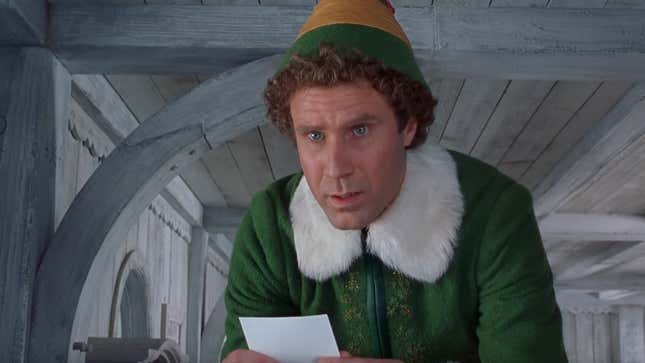
2003 was an exciting time for Christmas movies. As Love Actually and Bad Santa gave adults a reason to get in the spirit, a little film about a big elf became a box office heavyweight. Jon Favreau’s Elf turns 20 on November 7, and it remains the most enduring and best Christmas film of the era for a reason. After the overblown, star-focused family comedies of the ’90s, the Christmas cheer was in short supply.
While 2003 signaled a return to form for the holiday genre, the ’90s were on the naughty list. In the years following Home Alone in 1990 and its 1992 sequel, studios leaned harder on major comedy stars and Arnold Schwarzenegger to play Scrooge. Bill Murray and Chevy Chase could tell you that star-driven Christmas movies aren’t new, and amid the mediocre star vehicles of the era, Disney released two masterpieces, Muppet Christmas Carol and The Nightmare Before Christmas. They just didn’t make Home Alone money. The highest-grossing Christmas family films released between 1992 and 2000, The Santa Clause, Jingle All The Way, and How The Grinch Stole Christmas, were close enough.
Sweeter than many of its successors, The Santa Clause fared much better than its competition in 1994. After Home Alone 2’s incessant brick-throwing, audiences passed on the sentimental remake of Miracle On 34th Street. A warm-hearted beard tugging is nothing compared to Santa Claus falling off a roof and dying. Santa Clause, which tracks Allen’s transformation into the big guy, won with audiences. The film’s $145 million domestic box office begat more effects-heavy, star-driven Christmas blockbusters about career-obsessed, absentee fathers learning to be parents for the holidays.
A refreshing change after a decade of downers
Reportedly budgeted at $75 million, roughly a quarter of which went to its star, 1996’s Jingle All The Way was The Terminator’s latest attempt at selling himself as the famous comedian Arnold Braunschweiger. Jingle is another “dad has to work on Christmas” movie (the opening sequences of Santa Clause and Jingle All The Way are nearly identical) that attempts to satirize the commercialization of the holiday but peaks with Schwarzenegger dressing as a Power Ranger and flying a jet pack.
More costly spectacles followed. Though Jack Frost (another “the American nuclear family is falling apart because dad is too obsessed with his career as a blues man” movie) beat Grinch to the holiday effects horror show, Ron Howard’s $125 million remake of a 30-minute Chuck Jones cartoon wrung over $340 million out of audiences. Howard’s Grinch is a full-on effects extravaganza, complete with laborious and Oscar-winning makeup that turns the little cuties of Who-ville into nightmarish rodent people from the Island Of Dr. Moreau.
All this, plus The Santa Clause 2, made Elf an exciting change of pace in 2003. Opening as counter-programming to the third Matrix movie, Elf became a sleeper hit that holiday season. It overperformed in many ways, especially considering Ferrell was then an unproven star. Still fresh off SNL, the comedian had begun to break out as a supporting player in hits like Zoolander and Old School. Elf solidified him as a lead who could star in adult comedies and family fare.
Will Ferrell’s onscreen persona meets its match
The premise of Elf is tailor-made for Ferrell’s unashamed man-child persona: A traditional fish-out-of-water tale in which a grown man dressed as a department store elf spreads Yuletide glee around a hardened New York City, where people are infamously “walkin’ here.” The big difference between Elf and the rest of the ’90s holiday films is where our sympathies lie.
Elf features a career-obsessed Scrooge of a father who learns the true meaning of Christmas, but he isn’t the lead. Instead, we follow Buddy’s journey, allowing his infectious enthusiasm for the holiday to drown out leftover irony from the previous decade. Through Buddy, Elf taps into the thing these other holiday movies ignored about Home Alone’s success: A child’s point of view and the expression of one’s inner child that doesn’t need teasing out. Favreau shares that perspective.
Years before he would become obsessed with Volume stages and photorealistic warthogs, Favreau mostly avoided The Grinch and Santa Clause 2’s emphasis on digital effects. The director employs time-tested techniques like forced perspective and stop-motion animation, á la Rankin and Bass TV specials, for his North Pole. Leon the Snowman and Mr. Narwhal feel novel in their unrepentant silliness after a decade of dads who don’t have time for Christmas. When Elf succumbs to the action movie trappings of Jingle All The Way, it stumbles. The final confrontation with Central Park Rangers and the Clausometer refill remains a lackluster conclusion and the movie’s worst chunk.
Speaking of the Clausometer, it’s been running low for years since. Elf remains a singular success as the genre continues to wallow. It says something that another Grinch and Robert Zemeckis’ dead-eyed mocap monstrosities are the most successful post-Elf holiday movies. Still, by retreating to simple effects and focusing on an up-and-coming star, Elf became the gift people don’t mind reopening.